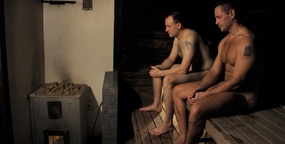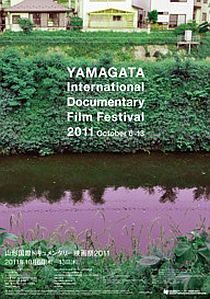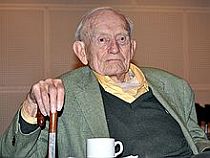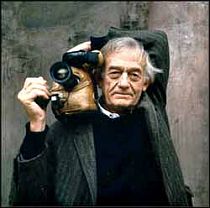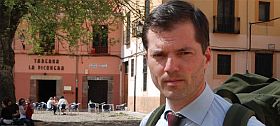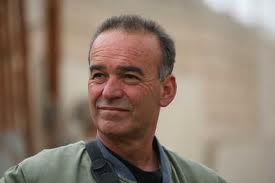A Richard Leacock mini-retrospective series took off last night (August 11) at the Danish Cinemateket in Copenhagen. The series includes not only masterpieces like ”Primary” and ”Crisis” but also less known works like ”Toby in the Tall Corn” and ”Happy Mother´s Day”. Our Paris correspondent Sara Thelle attended the opening screening as did Perle Møhl. The two Danish women, living in Paris, have helped Richard Leacock and his spouse Valerie Lalonde put together the memoirs of the master. A book with clips will come out in September. Cinemateket asked me to make an introduction to Leacock. It follows here, in Danish language:
Det er lidt af en gave til mig at kunne stå her og tale om en af giganterne i dokumentarfilmens historie. En mand som ikke bare har lavet film som hører hjemme i enhver filmhistorisk fremstilling, men også en mand, som med sine klare holdninger til sin métier rører ved dokumentarfilmens inderste væsen og dermed stadig er en konstant inspiration for nye dokumentarister.
Jeg underviser på en dokumentarfilmskole i Italien og det er grundlæggende pensum, når eleverne starter deres tre årige uddannelse med at se Leacocks film eller klip fra dem, når der skal tales om den observerende dokumentarfilm. Den som Leacock og hans kolleger i Direct Cinema stod for. Eleverne elsker dem. Både de mere playful, som I skal se eksempler på i dag og de ”tunge” mesterværker, som giver en unik indsigt i amerikansk historie. Jeg tænker på filmene ”Primary” og specielt ”Crisis”, som kan ses her næste torsdag (18. September).
Leacock har undervist på filmskolen i Italien, ja over hele verden, og det har altid været til stor inspiration at have oplevet ham som underviser – og/eller set ham på film eller på YouTube, hvor der er masser af materiale med ham. Jeg har haft fornøjelsen at møde
ham et par gange, f.eks. på et dokumentarfilmmarked i Marseille engang i 90’erne, hvor hans entusiasme var stor, når han talte om den nye teknologi, de nye kameraer og de muligheder, som de har givet for at lave film her og nu. Som I vil se senere, er der en friskhed og ægte begejstring over Leacock, når han taler om teknikkens mulighed for at nærme sig det herlige liv, som er vores, på godt og ondt, og som han var forelsket i. Han havde en umættelig appetit på livet. Det var hans evigt smukke ambition at filmene skulle give os tilskuere ”a sense of being there”.
Jeg taler i datid for Leacock døde som bekendt den 23. Marts i år nogle få måneder før han ville være fyldt 90…
Lad mig hoppe tilbage til Direct Cinema, nogle kalder det Cinéma Vérité, som var revolutionerende for den dokumentariske filmkunst. En bevægelse som har haft den samme betydning for den dokumentariske film, som den franske nybølge for spillefilmen.
I serien her i Cinemateket vises som sagt ”Primary”, som er fra 1960. Filmen følger en valgkamp mellem JFK og Hubert Humphrey i Wisconsin og står stadig som et vidunderligt tæt-på- portræt af først og fremmest den kommende præsident. Behind the scenes, ville man kalde det i dag. Den tæthed som filmen er i stand til at opnå, skyldes opfindelsen, kan man vel kalde det, eller udviklingen af det lette optageudstyr, der kunne registrere/optage synkron lyd. Der er nogle helt formidable optagelser fra Leacock og hans kamera-kollegers hænder, som ikke blot skyldes teknik, men i lige så høj grad evnen til at se på en måde, som er langt fra den gængse journalistiske rapportering. Den søger detaljen, nærbilledet for at nå frem til at skabe en atmosfære, en fornemmelse af at være til stede. En atmosfære skabt i klippebordet på grundlag af vidunderligt materiale af stor tæthed.
Disse film, ”Primary” og ”Crisis” (guvernør George Wallace der vil nægte to sorte adgang til universitetet og dermed kommer i konflikt med justitsminister og præsident, Robert og John F. Kennedy) er senere blevet ”genindspillet”, kan man sige, efter samme model, ”The War Room” om Clinton lavet af Leacocks kollega Pennebaker, og man kan vel også pege på danske pendanter, f.eks. ”Fogh bag facaden” af Christoffer Guldbrandsen. Og nu kan man læse at englænderen Nick Broomfield, en Direct Cinema elev, har lavet en film om fænomenet Sarah Palin!
En lille parentes – det synes så rigtigt, at hovedpersonerne i den amerikanske direct cinema bevægelse, alle med en glubende appetit på at skildre virkeligheden, gennem et temperament, for nu at bruge en formulering fra dansk dokumentarismes faderskikkelse, Theodor Christensen, har fået tilkendt et langt liv. Leacock blev som sagt 89, hans kollega, med hvem han skabte et produktionsselskab – to af filmene bliver vist i serien her, ”Happy Mother’s Day” og ”Monterey Pop” – Pennebaker er 86 år gammel, jeg så ham på dansegulvet på en festival i Damaskus sidste år. Albert Maysles som også var med i selskabet Drew Associates, som stod bag ”Primary” og ”Crisis”, er still going strong 85 år gammel og Robert Drew, journalisten som arbejdede for Life Magazine og hyrede de tre før-nævnte filmfolk til at lave sociale og politiske film, baseret på billedet og bevægelsen (dont tell it, show it) er 87 år gammel.
Denne observerende filmstil, hvor et filmhold går ind i et socialt rum, ikke spørger om noget, ikke arrangerer noget og er den såkaldte ”flue på væggen”, har haft og har en afgørende indflydelse på dokumentarfilmens udvikling. Jeg vil undgå ”talking faces”, hører jeg fra eleverne på filmskolen i Italien, og helst ingen interviews. Det bliver ofte til timevis af optagelser, den billige videoteknik tillader det, og det er ikke nødvendigvis af det gode, hvis man ikke ved, hvad man går efter…
Som alle andre filmiske bevægelser er ”direct cinema”-folkene blevet beskudt med argumenter om at de tror, de formidler sandheden, som Albert Maysles har antydet, at han fanger med denne metode. Det har jeg nu aldrig hørt eller set Leacock påstå.
En stor fortsætter af ”direct cinema” er Frederick Wiseman, kun 81 år gammel, en portrættør af et andet Amerika, end det vi normalt præsenteres for i fiktionens ramme.
Wiseman har ofte provokeret ved at sige, at han ikke accepterer betegnelsen ”documentary” fordi det giver associationer til at her får du sandheden serveret, og det får du naturligvis ikke, når du hele tiden skal vælge kameravinkel eller klippe din film. Forskellen på Wiseman og direct cinema folkene er helt tydelig, Wiseman er den intellektuelle sociologiske dokumentarist, Leacock et co. er interesseret i at fange ”what happens” og skabe en historie ud fra det optagne, oftest på et emotionelt plan. I øvrigt har Wiseman på sin facebook side sat tekst hen over sit billede: I am not a Flie on the Wall.
En anden kontrovers der har været omkring Direct Cinema, stammer fra Robert Drew, der insisterer på at blive krediteret som instruktør på Primary og Crisis. Til det er at sige, at det var måske hans idéer, men når Leacock på et spørgsmål omkring denne tvist i et YouTube klip siger ”well, Drew just sat in his office”, understreger det jo klart, at direct cinema folkene var kamerafolk, der skrev med deres kamera, le camera comme stylo, som de franske nybølge-folk sagde.
Nu skal vi se 10 minutter med Leacock, optaget i Normandiet i 2006. Leacock flyttede til Frankrig i 1989 og levede med Valerie Lalonde til sin død.
A Lovely Man… og herligt at se også et klip fra Louisiana Story, som Leacock filmede for Robert Flaherty. Jeg arbejdede i 20 år i Statens Filmcentral og denne film var konstant på hitlisten over de mest populære film. En sikker sats når børn skulle se noget eventyrligt. Flaherty (det er ham med Nanook of the North, den første dokumentarFILM) betød enormt meget for Leacock. Nu giver jeg en lille, samlet introduktion til de fire film, som skal vises:
Først hans film som 14-årig, omkring 7 minutter lang, om bananproduktion og –transport. Optaget på de canariske øer, hvor Leacocks far havde en bananplantage. En imponerende film og apropos Statens Filmcentral lige præcis den type dokumentariske undervisningsfilm, som kataloget var fyldt med. Danske Jørgen Roos sagde altid, at på filmskolen skulle man som det første lære at skildre, hvordan en fanø-pige arrangerer sin hovedbeklædning Det var en slags svendeprøve. Leacock var 14 da han viste, hvordan det kunne gøres. 1935.
Så ”Jazz Dance” som er en fuldstændig forbløffende tour-de-force fra en natklub, hvor – sorry – Leacock går helt bananas med det håndholdte kamera, han danser med de dansende, han fanger detaljer, nærbilleder, fødder, ben, kvinder med stor vidde i kjolerne. Det er så veloplagt og det udstråler glæde og lever op til ambitionen om ”the feeling of being there”. Og det har en struktur, en stigende kurve i intensitet. 1954. Roger Stilton krediteres som instruktør.
Tredie film, hvor Leacock var ansvarlig for det hele, ”Toby in the Tall Corn”, er mere klassisk, benytter sig af fiktive greb, en journalist opsøger et folkeligt telt-teater, filmen har en kommentar og et budskab og viser Leacocks sociale engagement i beskrivelsen af Toby, teatrets leder. Læg igen mærke til hans fantastiske evne til at fange ansigter og udtryk, nærbilledet. 1954.
Og til slut – I har allerede set et klip derfra – ”Happy Mother’s Day” som er et tidligt mesterstykke fra Leacocks hånd, et bestllingsarbejde, som bestilleren ikke kunne lide, da en færdig film lå der. Leacock og Pennebaker lavede så deres egen version om familien Fisher, der får femlinger og har gevaldige problemer med at holde omverdenen væk. En ”invasion of privacy”.
For flere oplysninger om serien, se tekst nedenfor.



